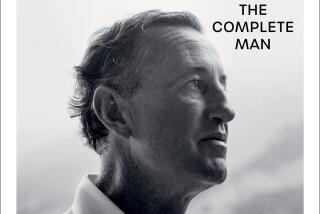Review: William Boyd’s Bond novel ‘Solo’ puzzles over its mission
There is no big set piece to open “Solo,” the new James Bond novel by British author William Boyd. The secret agent best known as 007 doesn’t launch the story with an extravagant car chase, sky diving stunt or gunfight.
The book is populated with attractive women, several of whom Bond escorts to bed, but they don’t have sexually fanciful names such as Pussy Galore and Holly Goodhead. And though Q, the master of spyware gadgets whose past inventions include a laser-cutting wristwatch and an ejection seat, still outfits Bond with covert tools for “Solo’s” espionage assignment, the most exciting gizmo he has to tender is a knockout potion concealed in after-shave.
Boyd’s Bond, in other words, shares not that much with Hollywood’s version of the Ian Fleming character, which is “Solo’s” strongest attribute and ultimately its most evident limitation. Granted the opportunity by the estate of Fleming, who died in 1964, to create an original tale not bound by the constraints of modern Bond fluency, Boyd has written an intriguing novella that, on an absolute scale, is a tidy little 1960s war-for-oil tale.
Books: Sign up for our email newsletter
“Solo” feels a bit diluted relative to the character’s enduring mystique, yet that may be exactly what Boyd is after: given both man and Superman, he’s chosen to focus his attentions on the former, a welcome change from Fleming’s approach.
Boyd has tackled espionage quite competently in “Waiting for Sunrise” and “Restless,” novels that covered World War I, World War II, the Cold War, betrayals, double agents — all of the foundations of the genre, elevated with literary flourish. More often than not, Boyd likes to take rather ordinary folks and drop them into nearly impossible situations, and his brilliance as a writer largely rests with how he extracts these characters.
And if these fictional people are sympathetic, they are not necessarily laudable: Boyd is fond of antiheroes. That formula, quite obviously, is not well suited to James Bond, whose essence is his superiority over all others; there’s no doubt he’ll come out on top, and even if you sully him a bit, he’s still heroic.
At the start of “Solo,” Bond is in the midst of a dream or, for him, something of a nightmare — the memory of an early assignment. The year is 1944, moments after the Normandy invasion. A 19-year-old Bond, part of a British commando team charged with capturing Nazi “documents, files and encoding devices,” is nearly killed when his gun jams as a German bears down on him.
“He had stared death full in the face,” Boyd writes of Bond, unaware at that moment that it foretold “the pattern of the life ahead of him.”
Yet this Bond is uninterested in contemplating whether or not the reverie was a chronicle of a death foretold; he lives in and for the moment, much like the Sean Connery model. When the novel returns to the present, in 1969, the secret agent is celebrating his 45th birthday alone. A newspaper headline reminds us that the Vietnam War is spiraling into chaos, but Bond’s assignment takes him to a different part of the world, the fictional West African country of Zanzarim.
The former British colony is in the midst of a two year-long civil war, and Bond is instructed to tip the scales in favor of the Zanzarim army by removing from the battlefield (by whatever covert means suitable) their opponent’s “African Napoleon,” a commander named Brigadier Adeka. Bond will pose as a journalist to get close to the reclusive Adeka, and it is through Bond’s eyes that Boyd’s understanding of the region and its people comes into focus.
Boyd was born in Ghana and spent part of his early life there and in Nigeria, and when he writes about the continent, he does so calculatingly and persuasively. His first novel, “A Good Man in Africa,” was set in Africa, as were “An Ice-Cream War” and “Brazzaville Beach.” Zanzarim may be the most intriguing thing about “Solo,” and Boyd’s navigation of its geography, conflict and politics, including 007’s complicated encounter with an exotic local contact name Efua Blessing Ogilvy-Grant, is as forceful as it is short-lived.
Just as we grow hungrier for more from and about Zanzarim, it’s gone and forgotten, as Bond is compelled to go on an unauthorized, unaccompanied mission — hence the book’s title. While his rogue, “Solo” operation is instigated by a rather clever double-cross, the rest of his mission is uninspired. There’s an original enough villain, but if Bond’s conduct, and the rest of the novel, is going to be shaped in any way by the spy’s World War II preamble, Boyd isn’t inclined to serve the meal he’s set out, which makes his opening flashback feel like little more than literary window dressing.
The Fleming estate has handpicked other authors to craft new Bond novels, with Boyd preceded in the pageant by Jeffery Deaver (“Carte Blanche”) and Sebastian Faulks (“Devil May Care”). While it is to Boyd’s credit that he doesn’t feel constrained by, and even seems to work against, Bond mythology, “Solo” nevertheless feels like a missed opportunity.
In spy terms, Boyd has figured out how to bring the agent over to his side, but once he’s enlisted 007, Boyd doesn’t seem to know where in the world to send him.
Solo
A novel
William Boyd
Harper: 336 pp., $26.99
More to Read
Sign up for our Book Club newsletter
Get the latest news, events and more from the Los Angeles Times Book Club, and help us get L.A. reading and talking.
You may occasionally receive promotional content from the Los Angeles Times.








